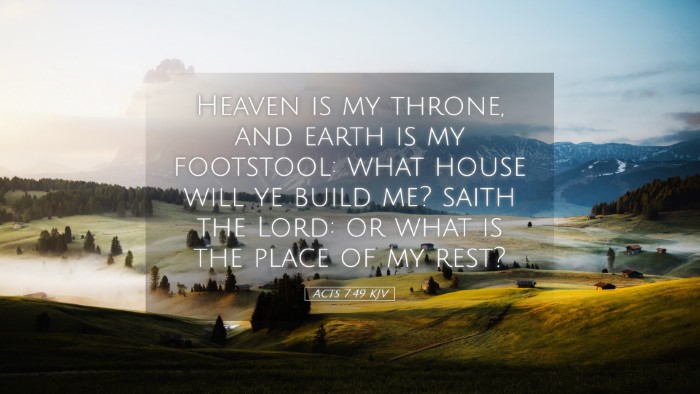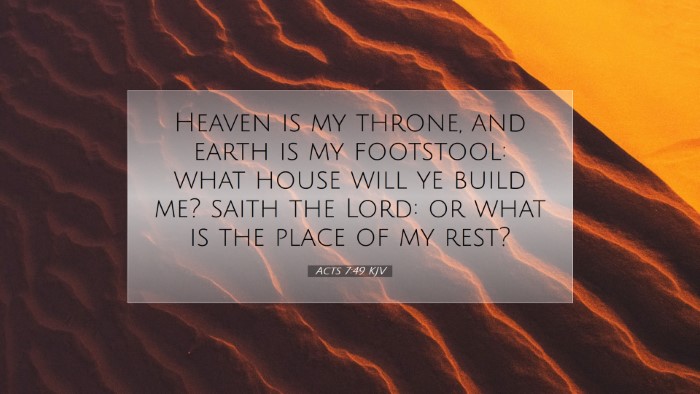Acts 7:49 Commentary
Verse Overview: Acts 7:49 states, "Heaven is my throne, and the earth is my footstool: what house will ye build me? saith the Lord: or what is the place of my rest?" This verse, spoken by Stephen during his defense before the Sanhedrin, encapsulates a profound theological assertion regarding the nature of God and His relationship to the physical realm.
Contextual Background
Historical Setting: The Acts of the Apostles is a critical narrative providing insight into the early church and the expansion of the Gospel. Stephen's speech in Acts 7 serves to highlight the Jewish leaders' misunderstanding of God and the church's mission. His reference to this verse alludes specifically to the Jewish temple, which represented the dwelling place of God amid His people.
Theological Insights
1. God's Sovereignty
Matthew Henry notes that this verse emphasizes God's sovereign reign over both the heavens and the earth. By declaring heaven as His throne and the earth as His footstool, God transcends the limitations of a physical structure, signifying that His presence cannot be confined to one location.
2. The Concept of the Temple
Albert Barnes highlights the importance of the temple in Jewish thought, which was considered the central point of divine presence. However, Acts 7:49 challenges this notion. It asserts that God does not dwell in temples made by human hands, which aligns with later revelations (e.g., Acts 17:24). The sacred space is now understood in a more expansive, spiritual context.
3. The Nature of Worship
Adam Clarke elaborates on the idea that if God cannot be fully contained or represented in a building, then true worship must be spiritual. This forms a foundational argument for understanding the believer's body as a temple of the Holy Spirit (1 Corinthians 6:19), advocating for a worship that transcends location and form.
Key Themes
- The Infinity of God: God's capabilities and presence are infinite; He exists outside the confines of time and space.
- The Inadequacy of Earthly Structures: Human attempts to contain God within physical edifices fall short of understanding who God truly is.
- Transformation of Worship: The passage invites believers to redefine their concept of worship, moving from temple-centered practices to a more holistic and personal relationship with God.
Application for Today
For Pastors
This verse encourages pastors to teach their congregations about the nature of God and the concept of true worship beyond just the physical gathering. It is essential to create an environment where worship is understood as a lifestyle and not merely an event.
For Students and Theologians
The theological implications of Acts 7:49 serve as a rich topic for study. It invites exploration into the intersection of Old and New Testament understandings of God's presence, leading to deeper theological discourse on the nature and essence of God.
For Bible Scholars
Scholars might examine the Jewish context of Stephen's speech and its implications for early Christianity, particularly as it relates to the development of ecclesiology and soteriology in the early church. The shift from a physical dwelling place to a relational understanding of God's presence is pivotal in this transition.
Conclusion
Acts 7:49 serves as a powerful reminder of God's majesty, the limitations of human constructs, and the invitation to engage in a transformative relationship with the Creator. As we process the teachings derived from this verse, may it inspire a deeper understanding of worship and the ever-present reality of God in our lives.


